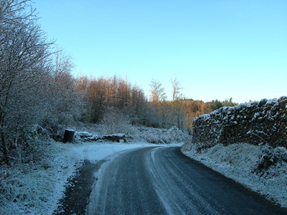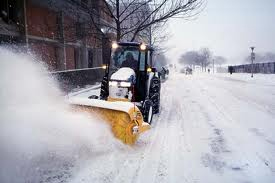 With temperatures hitting the minuses for most of the UK last week and, no doubt, more to come over the next few weeks. I thought it might be sensible to look at the associated risks that come with the cold.
With temperatures hitting the minuses for most of the UK last week and, no doubt, more to come over the next few weeks. I thought it might be sensible to look at the associated risks that come with the cold.
It is important to remember that when you’re as cold as ice, extra consideration should be given to health and safety.
It’s hard enough getting out in the cold to defrost the car in the morning, but with a large proportion of people undertaking some or all of their working day outdoors, it is important to remember the increased risks from the decreased temperature.
This week’s 2 recent HSE cases also look at accidents that could and should have been avoided.
- The panel fell trapping him on the ground across the forks of the forklift truck. He suffered five compression fractures of his pelvis, and a head injury.
- The worker suffered a head injury, including lacerations to the head and jaw and dislocated teeth.
As ever, if you have a subject that you would like us to cover one week, please contact us by phone 01458 253682, email or via our Facebook page or by Twitter.
Ice, ice, maybe?
I know I keep mentioning the Duty of Care aspect of legislation in these newsletters, but I cannot place enough importance on the fact that YOU MUST ensure the safety of your staff, whilst they undertake work for you.
Yes, and ice not only means it is cold, but also it is slippery. We have all seen or experienced slips on the ice, and ice can be a big risk in outdoor working environments like construction sites. It can, of course, also effect the walk from your car park to your office door.
Farmers need to break the ice off the water containers in the fields, often more than once a day, for their livestock to be able to drink.
It is important to take the added hazard and increased risk into account, and put in place the appropriate control measures needed.
Gritting, clearing and salting walkways regularly when the temperature drops should be an important part of winter site management.
But Remember it is not just people that can slip on icy surfaces, and vehicle routes also need assessing. The local authorities may well grit the main roads but they probably will not do the minor roads and definitely won’t be gritting your office car park. But you have a duty to your staff and any visitors, so make sure you consider this.
Snow is falling, all around me?
 Not yet, maybe. But with the cold weather arriving, could it be only a matter of time?
Not yet, maybe. But with the cold weather arriving, could it be only a matter of time?
Temporary roofs, scaffold sheeting and other temporary shields can be used to protect your site and working platforms from the elements, and help you comply with the legal requirement to provide a safe place of work.
But what about clearing the snow?
Sadly too many people have had heart attacks when clearing snow, quite simply because they were not fit enough to “get stuck in”. So BEFORE you grab a shovel or give some of your employees a shovel, ask yourself “Am I/is he or she medically fit enough to clear snow?” “Is there any need to clear it in the first place?” and if it needs clearing “Are there any mechanical aids I can get to ease the work?”
You’re as cold as ice
It’s not just safety risks to think about in the cold, but also the health of the workers.
Wrap up warm! Clothing and PPE must be suitable for protection against the cold particularly in cold windy, icy or snowy conditions. I have seen workers out wearing PPE provided by their employer, that quite simply is not adequate. They may be ok in a quick summer shower but definitely NOT good enough in winter conditions. Of course sometimes the employer does supply suitable clothing but the employee doesn’t wear it because “I left it back home mate” or “I’m alright, I don’t feel the cold” – Read next section!
Welfare and rest facilities need to provide a warm place of rest to allow the workforce to get a break from the cold.
‘Companies have a responsibility to provide adequate welfare facilities:
Frequent breaks should be encouraged to give workers regular opportunities to warm through, and change gloves, socks and other clothing if it has become wet.
Warm drinks and snacks should be available, particularly warm liquids such as soups, teas, coffees and hot chocolates.
The cold never bothered me anyway?
If workers show signs of shivering and loss of coordination, not only does this, in itself, increase the risk of accidents, but also shows they are being affected by the cold.
Raise awareness of the symptoms of cold stress and the early signs of hypothermia.
Slurred speech, memory loss and cold pale or blue skin are also indicators that quick action is needed.
So, do not let employees or your work mates, work out in the cold without the necessary warm clothing. They may say “I’m alright, I don’t feel the cold” but the truth is their bodies DO feel the cold and it can kill them or at least make them very ill.
Working outdoors:
For those working outdoors, the winter months bring additional challenges to keeping safe. Cold weather and shorter periods of daylight mean there is more potential for accidents to happen. With a little planning, and common sense, these can be avoided.
Operators of construction plant, such as diggers, tele-handlers, cranes etc. must ensure they regularly clean their windows so they can safely see all around. This should be combined with constant use of mirrors and a Banksman where appropriate. Lights on all vehicles should be cleaned regularly to ensure vehicles are visible at all times, and vehicle depots should be well lit to avoid slip and trip hazards – workplace transport accidents account for many of the deaths and injuries we investigate every year.
Farms and other outdoor enterprises must always ensure they have a suitable, robust procedure in place to make sure lone workers are safe. In winter this is even more vital – if a worker fell and broke a leg in a remote location in the dark, how would they summon help? And who would be responsible for ensuring they had returned home safely at the end of the day? Recent cases, including the tragic death of a gamekeeper have highlighted the vital importance of ensuring lone workers are protected and have the communications they need.
Our message this week is to ensure you do everything ‘reasonably practicable‘ to ensure the safety and welfare of your staff, make sure you complete adequate risk assessments, put a procedure in place to check on any lone workers, THINK carefully – ‘is it necessary for the job to be done’.
Obviously there will be lots of jobs that will require your staff to ‘brave the elements’; you just have to do your bit to ensure they are safe
If you need further information please call us on 01458 253682 or send us an email.
